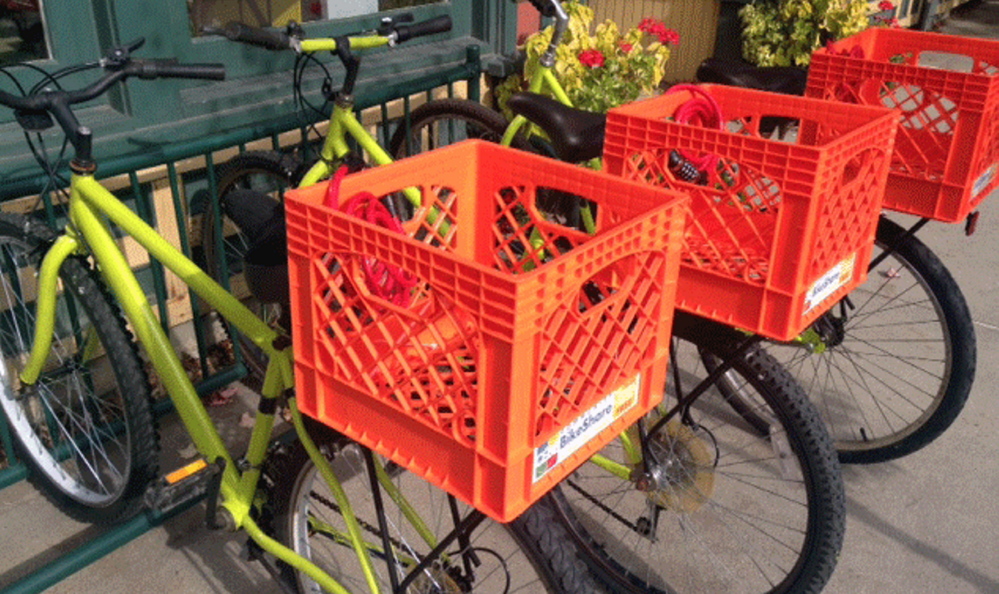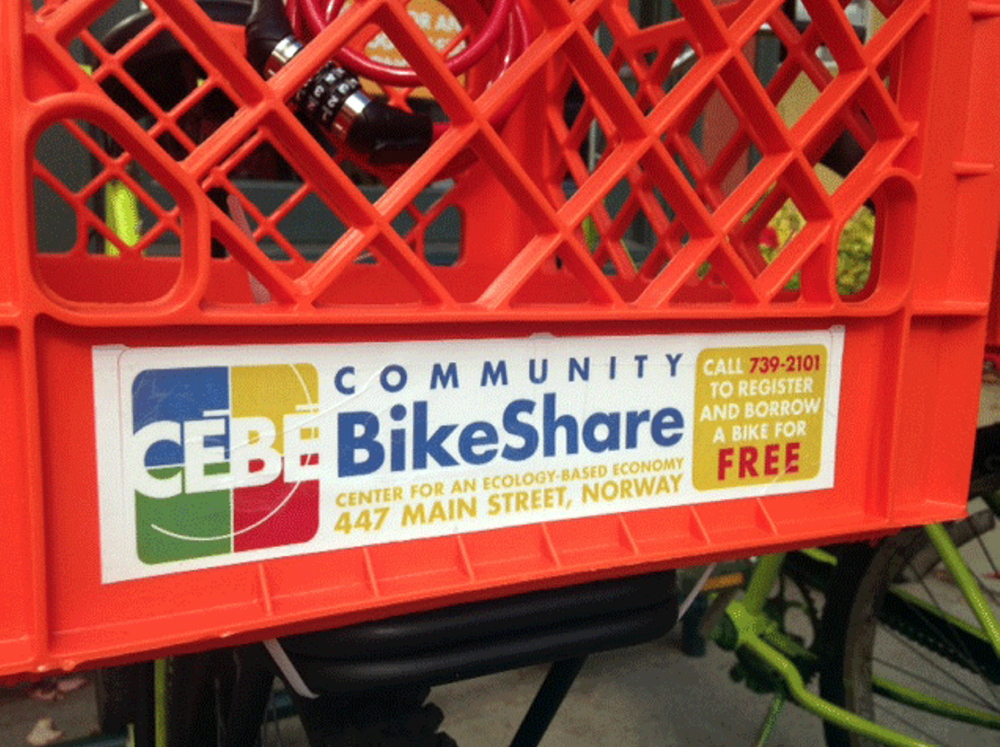Sometimes all it takes is a few people with a good idea and the willingness to say, “Let’s do it.” That’s how the western Maine town of Norway began one of the state’s only bike share programs.
Area residents can register for free to use one of the lime-green bikes with orange crates on the back. They can take the bicycles to local stores or ride out to a nearby lake.
Since the program began in April, more than 40 people have signed up. They include an unemployed man who uses the bikes to apply for jobs, a doctor who rides to her favorite cafe and a high school student who bikes to work at a sauna and pizza place.
Bike sharing has become very popular in large cities. Boston, New York, Philadelphia, Minneapolis, Seattle and Washington, D.C., are among the cities that launched bike sharing in recent years. The programs typically cater to tourists and commuters who can pick up and drop off bikes at dozens of stations. People pay as much as $15 for a half-hour of riding.
Portland received a federal grant two years ago to begin planning a bike share program. The city is looking for a nonprofit partner to own and manage it.
Norway’s program, and another underway in Machias, are modest by comparison. But they are well suited to the needs of small, rural towns.
Scott Vlaun played a key role in launching Norway’s bike share program. He is an organic farmer who is known for hauling his produce eight miles to town on the back of his bicycle. Vlaun is also the director of the Center for an Ecology-Based Economy, or CEBE, a volunteer-run nonprofit in Norway that promotes sustainable living.
The center started the bike share program as part of its mission to reduce carbon emissions. Vlaun said the program also fills a real need for people who have no vehicle. Some residents use the bikes regularly to get groceries.
Jeff Laughton of West Paris borrowed a bike after his car broke down. “It was a lifesaver,” he said.
Area residents donated used bikes to the program. The Norway Police Department gave the center unclaimed stolen bicycles it had recovered. CEBE holds “skill share” nights a couple of times a month, when volunteers repair the bikes to make sure they are safe to ride.
The center used a $1,000 start-up grant from the New England Grassroots Environment Fund to buy parts, crates, locks, signs and a bike rack.
The Kiwanis Club donated 20 bike helmets. The Bicycle Coalition of Maine’s Community Spokes program provided technical support with such things as drafting a waiver form. Liability insurance is the program’s biggest expense – more than $700 a year.
CEBE’s bikes – all hybrids and mountain bikes – are locked on a rack in front of the group’s Main Street office. The center hopes to add a second station with bikes in South Paris soon, and eventually to install three more stations.
Logging trucks rumble through downtown Norway, making it far from a bicyclist’s paradise. Many roads in the area lack shoulders. So it’s not surprising that some residents are afraid to try the bike share program.
Vlaun offers to ride with them on their first trip to help them feel more comfortable. Everyone who registers for the bike share program gets safety information. They can use the bikes in an area that encompasses the downtowns of Norway, Oxford and South Paris, as well as the recreation area at Pennesseewassee Lake.
One potentially touchy issue in a small town is whether a bike share program would siphon business away from the local bike shop.
The Center for an Ecology-Based Economy tries to limit use of its bikes to an hour or two at a time, and steers people to the Green Machine Bike Shop in Norway if they want to rent bicycles for a longer period. The store has helped the bike share program by providing technical advice and a discount on parts.
“We’re just trying to keep an open mind and be helpful,” said John Harvey, the Green Machine owner. “Those guys are customers, too.”
More than 200 miles away, the coastal town of Machias also started a free bike share program in the past year. The 85-mile Down East Sunrise Trail runs through town, making it an ideal location for bicycling.
The town used a Healthy Main Street grant to install more than 30 bike racks at schools, trail entrances and other locations. Area residents donated used bicycles. At least initially, the bikes will be unlocked, so anyone can hop on.
I hope Norway and Machias will inspire other Maine towns with their homegrown approaches to bike sharing. For a modest investment, they are reducing pollution, helping people get exercise and providing transportation to those who need it.
Shoshana Hoose is a freelance writer who bicycles in Greater Portland and beyond. Contact her at shoshanahoose@gmail.com.
Send questions/comments to the editors.




Success. Please wait for the page to reload. If the page does not reload within 5 seconds, please refresh the page.
Enter your email and password to access comments.
Hi, to comment on stories you must . This profile is in addition to your subscription and website login.
Already have a commenting profile? .
Invalid username/password.
Please check your email to confirm and complete your registration.
Only subscribers are eligible to post comments. Please subscribe or login first for digital access. Here’s why.
Use the form below to reset your password. When you've submitted your account email, we will send an email with a reset code.